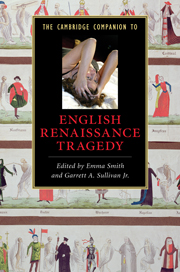Book contents
- Frontmatter
- Part 1 Themes
- Part II Readings
- 11 The Spanish Tragedy and metatheatre
- 12 Doctor Faustus: dramaturgy and disturbance
- 13 Edward II: Marlowe, tragedy and the sublime
- 14 Arden of Faversham: tragic action at a distance
- 15 The Revenger’s Tragedy: Original Sin and the allures of vengeance
- 16 The Tragedy of Mariam: political legitimacy and maternal authority
- 17 The Changeling and the dynamics of ugliness
- 18 The Duchess of Malfi: tragedy and gender
- 19 ’Tis Pity She’s a Whore: the play of intertextuality
- Index
15 - The Revenger’s Tragedy: Original Sin and the allures of vengeance
from Part II - Readings
Published online by Cambridge University Press: 28 November 2010
- Frontmatter
- Part 1 Themes
- Part II Readings
- 11 The Spanish Tragedy and metatheatre
- 12 Doctor Faustus: dramaturgy and disturbance
- 13 Edward II: Marlowe, tragedy and the sublime
- 14 Arden of Faversham: tragic action at a distance
- 15 The Revenger’s Tragedy: Original Sin and the allures of vengeance
- 16 The Tragedy of Mariam: political legitimacy and maternal authority
- 17 The Changeling and the dynamics of ugliness
- 18 The Duchess of Malfi: tragedy and gender
- 19 ’Tis Pity She’s a Whore: the play of intertextuality
- Index
Summary
Vindice, the protagonist of Thomas Middleton's fiercely violent, fiercely funny The Revenger's Tragedy (published 1607), is explicitly conscious of his participation in a tragic plot of revenge. In his opening lines, acting as the drama's chorus, Vindice prepares his audience for the scope of the ensuing action by telling them that vengeance 'show'st [it]self tenant to tragedy'; in the play's final scene he celebrates the series of murders he has orchestrated by announcing that 'When thunder claps, heaven likes the tragedy'. Along the way, he delights in explaining his 'tragic business' to his brother and co-conspirator Hippolito, to whom he offers a pungent theory of the genre: 'When the bad bleed, then is the tragedy good' (3.5.202).
This ruthlessly single-minded definition - of tragic theatre as artistically achieved retribution - lies at the heart of Vindice's pursuit of vengeance, giving rise to his multiplying, and increasingly grisly, plots for revenge. Such plots, which combine medieval allegory with the bitter, topical satire of Jacobean anti-court drama and its critique of aristocratic corruption, are part of a parodic exposure of, as well as an original contribution to, the theatrical and thematic obsessions of Elizabethan revenge drama: the nature of crime and punishment, the obligation of the dead to the living, the limits of earthly and divine justice, the place of the individual in an increasingly bureaucratic state, the interdependence of male honour and female sexuality, and, finally, the relation of acting and being, the stage and the world.
- Type
- Chapter
- Information
- The Cambridge Companion to English Renaissance Tragedy , pp. 200 - 210Publisher: Cambridge University PressPrint publication year: 2010



